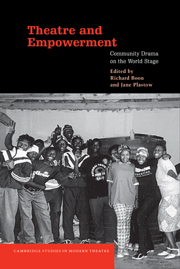Book contents
- Frontmatter
- Contents
- Notes on contributors
- 1 Introduction
- 2 The Wedding Community Play Project: a cross-community production in Northern Ireland
- 3 The Poor Theatre of Monticchiello, Italy
- 4 ‘What happened to you today that reminded you that you are a black man?’ The process of exploring black masculinities in performance, Great Britain
- 5 Wielding the cultural weapon after apartheid: Bongani Linda's Victory Sonqoba Theatre Company, South Africa
- 6 Dance and transformation: the Adugna Community Dance Theatre, Ethiopia
- 7 The Day of Mourning/Pilgrim Progress in Plymouth, USA. Contesting processions: a report on performance, personification and empowerment
- 8 South Asia's Child Rights Theatre for Development: the empowerment of children who are marginalised, disadvantaged and excluded
- 9 Theatre – a space for empowerment: celebrating Jana Sanskriti's experience in India
- Index
9 - Theatre – a space for empowerment: celebrating Jana Sanskriti's experience in India
Published online by Cambridge University Press: 22 September 2009
- Frontmatter
- Contents
- Notes on contributors
- 1 Introduction
- 2 The Wedding Community Play Project: a cross-community production in Northern Ireland
- 3 The Poor Theatre of Monticchiello, Italy
- 4 ‘What happened to you today that reminded you that you are a black man?’ The process of exploring black masculinities in performance, Great Britain
- 5 Wielding the cultural weapon after apartheid: Bongani Linda's Victory Sonqoba Theatre Company, South Africa
- 6 Dance and transformation: the Adugna Community Dance Theatre, Ethiopia
- 7 The Day of Mourning/Pilgrim Progress in Plymouth, USA. Contesting processions: a report on performance, personification and empowerment
- 8 South Asia's Child Rights Theatre for Development: the empowerment of children who are marginalised, disadvantaged and excluded
- 9 Theatre – a space for empowerment: celebrating Jana Sanskriti's experience in India
- Index
Summary
31 May 1985
Dear Naresh,
I hope you are well. You have asked me how I am spending my days. I do not know exactly what to say … All kinds of thoughts come to my mind nowadays. I never used to think like this before. I read somewhere that it is not until you reach the top of the hill that you realise yours was not the only path. If only it did not take so long to realise these things. Anyway, let me tell you about some of my thoughts, some of my experiences.
In South Kolkata, near Ballyganj railway station, there is a large slum. A number of us meet there on Sundays and holidays. Except for me all the others work for a Ballyganj-based NGO. The people who live in these slums have come from different villages that fall under the Sunderban Development Authority. They are not alike. Those who come from the vicinities of the Sunderbans [a delta forest] have an intimate relationship with rivers and the jungles that grow on the swamps. Those who come from near the railway tracks have no link with water and marshy land. They are heavily influenced by Kolkata. These diverse people, some from villages near the city, some from remote areas, have come together in this slum, tied together now by a common struggle for daily existence.
In the villages there is not enough work to keep them busy for the whole year. So they are in the city now in search of a living. Some work as domestic labour, some are wage workers on construction sites. A few are hired by pandal [a decorative canopy used in festivals] decorators, some work in small food shops. […]
- Type
- Chapter
- Information
- Theatre and EmpowermentCommunity Drama on the World Stage, pp. 220 - 257Publisher: Cambridge University PressPrint publication year: 2004
- 1
- Cited by



